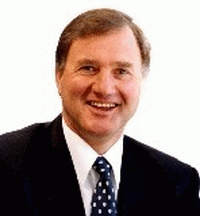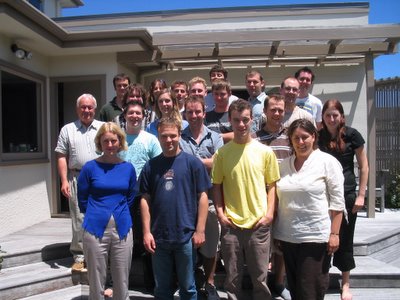Was the Green's "Mr Clean", a Marxist-Leninist?
This has been interpreted as a clear signal that the Greens will go past their two male MPs, Keith Locke and Nandor Tanczos.
Both MPs would be electoral liabilities in a leadership role. Locke is widely regarded as a loony leftist, while Tanczos' dreadlocks, dope smoking and anarchist background do not endear him to middle class voters.
Many eyes are on Russell Norman, number 10 on the Green Party List and the Party's campaign manager in 2005.

Norman's Green Party website bio states that he came to NZ in 1997 after being active in the Australian Green's for two years. It also states that in his youth (he was born in 1967) "I was involved in many environmental and social justice campaigns in Australia eg. student fees, union issues, Aboriginal land rights, peace, and native forest logging."
On November 14th 2005, Brisbane based, leftwing Blog, "Larvatus Prodeo" speculated that Russell Norman might replace the late Rod Donald as Green co-leader. Larvatus Prodeo contributor "Naomi" quoted NZ's "Independent"
"The Greens' newly appointed commander of artillery - otherwise known as the party's campaign manager - is a lanky, young, Australian-born activist by the name of Russell Norman. A staunch Green Party member for more than 10 years, Norman also has close personal ties to former Alliance power-couple Laila Harre and Barry Gribben. One of several left leaning shareholders in Gribben's Waiheke Island vineyard... the Greens' new strategist is as comfortable among Gribben's rough reds as he is among the organic wine drinkers of his own party."
There were two interesting replies to this post
Mark 10 November 2005 at 3:00 pm
"Comrade Norman has travelled a long way since his condemnations of reformists on the parliamentary road as an SWP activist. Perhaps it’s the good vintages?"
Lefty Elitist 10 November 2005 at 10:34 pm
"Cripes. I know Russell from an extremely brief, late 80s DSP interludette (I know… but im tellin ya, they had the best parties in Brisbane). Hadn’t realised he’d got the big campaign job. Last I heard he was out on the Bay of Islands."
The SWP referred to, was almost certainly the Socialist Workers Party. The SWP was a Marxist-Leninist party, originally affiliated to the "Fourth International", as its name suggests, an international grouping of Trotskyite parties.
In 1984, the entire SWP infiltrated the fledgling Nuclear Disarmament Party, led by "Midnight Oil" vocalist, Peter Garrett. The resulting publicity virtually destroyed the new organisation.
In the late 80s the SWP failed in merger attempts with two other Marxist-Leninist parties, the Communist Party of Australia and the Socialist Party of Australia.
In 1990, the SWP changed its name to the Democratic Socialist Party and began to work closely with the environmental movement. It published a paper called "Green Left Weekly", but maintained both its Marxist-Leninist philosophy, tactics and extensive links with Marxist-Leninist parties in Australia and abroad. It was also extremely close to NZ's Alliance Party.
The post by "Lefty Elitist", mentions Norman as being involved in the "DSP" in the "late 80s". At that time the DSP was still the SWP, but it is quite common for leftist commentators to interchange the names. Incidentally, The DSP now stands for "Democratic Socialist Perspective" as the party is now part of the Australian Socialist Alliance.
I have already documented the extremely close ties Keith Locke has had to the DSP. I have also documented Jeanette Fitzsimon's attendance at a DSP organised international communist conference (She told Green Left Weekly number 147 "If socialism is to survive as a relevant political movement in the 21st century, it must develop a response to the ecological crisis and a socialist strategy to build a sustainable future.")
The links between the Greens and a Marxist-Leinist Party like the DSP are a cause for concern.
How serious would it be if it were proven that the Green's potential new co-leader was once a member of this organisation? What if he were still in contact with his old comrades until recent years? That would make three leading Greens involved with one of the most vigorous Marxist-Leninist parties in our region.
The conclusive evidence that Norman has had some DSP connection were several articles he wrote for Green left Weekly in the late '90s. They included;
1996 Article in GLW No 248 A Divided NZ Heads for the Polls"
1996 Article in GLW No 249 NZ's Politics of Hate and Fear
1997 Article in GLW No 288 Winston's Winebox Empty
1999 Article in GLW 363 NZ Labour Sinks GE Bill
Was Russell Norman the DSP's NZ correspondent? The Green Party needs to answer some questions. They claim not to be a socialist party, but several of their leading people have easily documentable Marxist-Leninist connections.
Is the Green Party willing to explain this connection? Is it willing to shed more light on Russell Norman's possible SWP/DSP background?




























